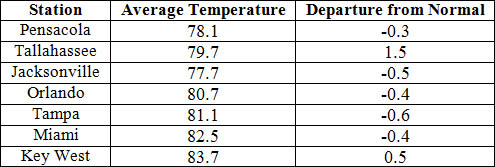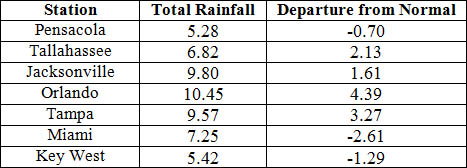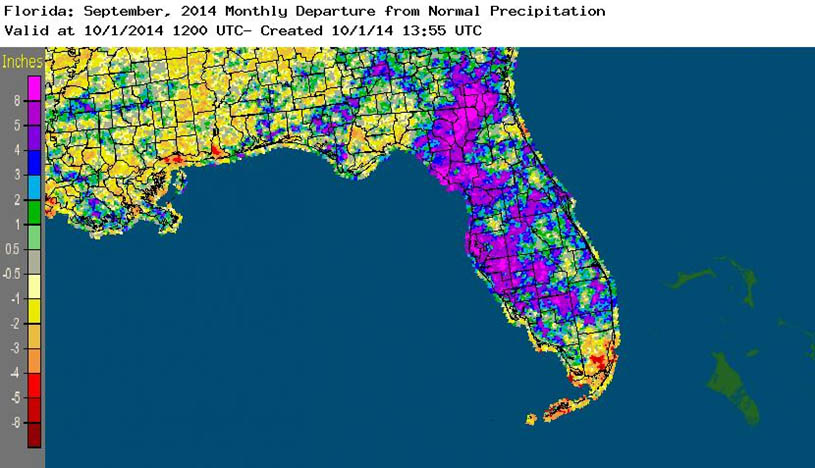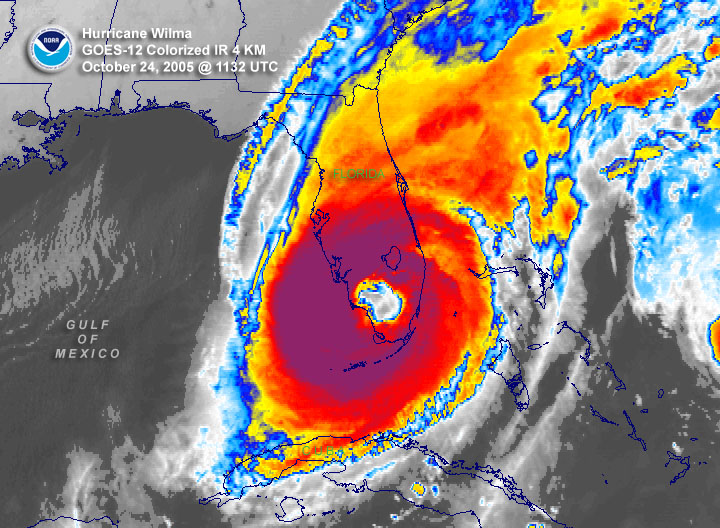Dear Florida Climate Center Friends,
We'd like to present you with the October 2014 edition of our newsletter. In this newsletter, you'll find our monthly climate summary, a list of special events that our staff attended, some pictures, and more. If you have any questions, please email us at climate@coaps.fsu.edu.
Thanks,
The Staff of the Florida Climate Center
 |  |  | David Zierden
State Climatologist | James O'Brien
Professor Emeritus | Melissa Griffin
Asst. State Climatologist |
|
September Climate Summary for Florida
The Florida Climate Center's September 2014 Florida Climate Summary is now available. The summary provides an analysis of temperature and precipitation trends across the state, along with data on hazardous weather, drought, the impacts of the weather and any records tied or broken for the month. During September, average temperatures were near normal and rainfall totals were varied across most of Florida. ENSO-neutral conditions are continuing in the equatorial Pacific. The Climate Prediction Center (CPC) predicts above normal temperatures and above normal precipitation for the state through December. Past summaries are archived here.
| September average temperatures and departures from normal (°F) for select cities. |  |
| September precipitation totals and departures from normal (inches) for select cities. |  |
| A graphical depiction of the monthly rainfall departure from normal (inches) for September (courtesy of NOAA, NWS). |  |
|
|
Florida Scientists Call for Climate Change Solutions Summit
Earlier in August, ten scientists from various Florida universities, including Florida State University, delivered a letter to Governor Rick Scott asking for a meeting so that they could discuss the science of climate change. The 30-minute meeting took place on August 19th, where the governor stressed that he was looking for solutions, not just rhetoric about the problem.
In a response to that call for solutions, 42 Florida scientists from various universities, including ten from Florida State University, wrote another letter to Governor Scott and policy makers proposing solutions and a change summit. Florida State Climatologist David Zierden is one of the scientists whom signed the letter and the Florida Climate Center is poised to provide scientifically sound climate and climate change information in support of these solutions.
http://www.tallahassee.com/story/news/2014/09/18/university-scientists-call-climate-change-summit/15824083/
|
|
State Climatologist Presents on Climate Change in Florida to FSU's EOAS Department
On September 15th, State Climatologist David Zierden gave an invited talk to Florida State's EOAS Department on Climate Change in Florida.
In last year's Fifth Assessment Report, the Intergovernmental Panel on Climate Change (IPCC) concluded the warming of the global climate system was irrefutable, and that it is now extremely likely (95% confidence) that human activity and the release of greenhouse gasses is responsible most of the observed warming in global temperatures. The U.S. National Climate Assessment released earlier this year states that climate change is already affecting the American people in far-reaching ways and that evidence of climate change appears in every region and impacts are visible in every state.
State Climatologist David Zierden presented some basic concepts in the science of climate change, then focused on historical variations seen in the State of Florida and the Southeast U.S. Variations in temperature and precipitation were tied to a variety of forcing, including inter-annual and decadal variability, land use changes, and greenhouse gas concentrations. Other aspects of climate change that impact the state were also examined, including hurricanes, extreme events, and sea level rise.
The program also showed a few examples of the successful application of climate science and prediction in the sectors of agriculture and water resource management.
|
|
USDA Funded Project Wins Award
The USDA National Institute of Food and Agriculture (NIFA) has selected the Southeast Climate and Extension Project team to receive the NIFA Partnership Award for Multistate Efforts. The Florida Climate Center has contributed to this multi-institutional, multi-disciplinary project since 2009. As part of their activities with the project, State Climatologist David Zierden has presented materials and facilitated discussions of adaptation and mitigation strategies to climate variability during workshops, while Assistant State Climatologist Melissa Griffin has been responsible for the development of a weather and climate toolkit to be used as an educational outreach tool. Both members of the climate center have contributed to a variety of climate related fact sheets that focus on the impacts in the Southeast. A member from the project will attend the award ceremony on October 23rd in Washington, DC to receive the award on behalf of the entire team.
|
|
ENSO Update and Climate/Agricultural Blogs
The Florida Climate Center has become active in two new climate and agriculture blogs and will be contributing occasional articles.
The "Climate and Agriculture in the Southeast" blog is provided by the UGA Crop and Soil Sciences Department as a service to Extension agents and agricultural producers across the Southeast US. Extension Climatologist Pam Knox administers the site and the Florida Climate Center frequently adds content about the Tri-State area. Come here to find out information about the impacts of weather and climate on agriculture across Georgia and beyond.
http://blog.extension.uga.edu/climate/
The other blog is called SIFT (Southeast Innovative Farming Team) and was formed by the Tri-State Climate Working Group for Row Crop Farmers. SIFT is an online platform to strengthen information exchange and learning among farmers, extension professionals and researchers in the SE USA. This website is a dynamic space to support continuous interactions among participants who are part of existing agricultural networks, such as the Tri-state row crop climate learning community and the FL soil health and cover crop network.
http://www.siftag.org
State Climatologist David Zierden has put an update on the possible El Nino on the SIFT website, talking about how El Nino is still "sitting on the fence" and how it is already late in the year for an event to develop.
http://www.siftag.org/el-nino-already-late-to-the-party/
|
|
Upcoming Events
October 28-30, 2014:
NOAA CDC Heat and Health Summit in Silver Spring, MD
November 13-14, 2014:
Florida Agriculture Financial Management Conference in Orlando, FL
November 18-20, 2014:
Fall Review of the Southeast Climate Consortium in Auburn, AL
January 4-9, 2015:
Annual Meeting of the American Meteorological Society in Phoenix, AZ
|
|
Special Report: Florida'sHurricane Drought

On October 1st, it will have been 3,264 days since Hurricane Wilma made landfall in Cape Romano, Florida on October 24, 2005 as a Category 3 hurricane. This was the last hurricane to impact the state, making this last 9 hurricane seasons the longest stretch of consecutive years without a Florida landfall. The longest period prior to this was the 5 years between 1980-1984. While weary Floridians have welcomed the break after the active 2004 (Charley, Frances, Jeanne and Ivan) and 2005 (Dennis, Katrina, and Wilma) seasons, the threat of hurricanes is real every year. Even though the 2014 Hurricane Season ends on November 30th, there is still plenty of time to prepare... because it's not a matter of 'if' but 'when' the next hurricane will make landfall in the state.
|
|
About Us
The Florida Climate Center is part of a three-tiered system of national, regional, and state climate offices, including NOAA's National Climatic Data Center and the Southeast Regional Climate Center. The Florida State Climatologist and other staff at the Florida Climate Center provide the following information and services to the people of Florida:
· Climate Data:
Historical weather observations for weather stations throughout the state of Florida. We are able to provide data for most stations from 1948-present.
· Climate Information:
Long-term historical averages for various stations, climate divisions, and the entire state.
· Extreme Event Records:
Information and analyses on extreme events such as freezes, droughts, floods and hurricanes.
· Special Analysis:
With their vast knowledge of El Niņo, La Niņa and climate variability, the State Climatologist and staff can offer expert insight into Florida's climate trends.
· Outreach:
Activities, presentations, and workshops that inform and educate the people of Florida about current and emerging climate issues. We also coordinate volunteers for the Community Collaborative Rain, Hail & Snow Network (CoCoRaHS).
More About Us
|
|